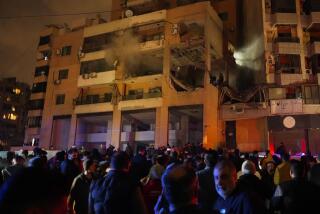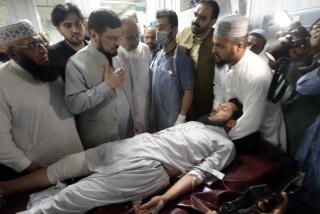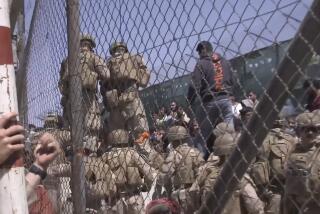Key Foe of Taliban Is Dead, U.S. Says
WASHINGTON — The guerrilla leader of Afghanistan’s opposition force appears to have been killed in a suicide bombing that could in turn rip apart the only movement left fighting the ruling Taliban, senior U.S. officials said Monday.
Ahmed Shah Masoud, a warrior-intellectual who beat back seven Soviet incursions into his home region in the 1980s, was the victim of a bomb hidden in a television camera or on the body of a man posing as a journalist that went off at the remote base of the Northern Alliance in Khodja Bahauddin, according to Masoud’s aides. However, they insisted Monday that he had survived the attack.
A legend in South Asia, Masoud inspired the Ken Follett novel “Lie Down With Lions” and was portrayed in the Sylvester Stallone movie “Rambo III.” For his military daring during a quarter of a century at war with the Soviets and other Afghans, he was nicknamed the Lion of the Panjsher, a desolate region in northeastern Afghanistan.
The assertion by Masoud aides that he had only been injured may have been an attempt to prevent a Taliban military onslaught. In London, Ahmad Shayeq Qassem, spokesman for the Afghan Embassy, said he was “absolutely sure” that Masoud was alive and that his condition was improving. He said Masoud, 48, was in a hospital in Dushanbe, the capital of Tajikistan, with leg and hand wounds.
In Tajikistan, however, Afghan officials denied that Masoud had been flown to Dushanbe by helicopter for medical treatment, though they also asserted that he was alive. An official at the Afghan Embassy in Tajikistan, Dr. Muhiddin Mehdi, claimed that he had spoken to Masoud in Afghanistan by telephone Monday.
But senior U.S. officials reported Monday that Masoud had died shortly after the explosion. They said the movement appeared to be trying to buy time and mobilize its limited military force in case the Islamic fundamentalist Taliban regime attempts to take advantage of the loss of the charismatic leader.
The U.S. officials asked not to be identified because of the sensitive nature of the information and its sources.
At its daily briefing, the State Department said it had conflicting reports about Masoud’s status, but U.S. officials said privately that it would be inappropriate for the first formal announcement to be made in Washington.
Initial indications are that two Arabs traveling on European passports and posing as journalists were responsible, the U.S. officials said. A spokesman for Masoud’s Northern Alliance said the Arabs were killed when the bomb went off, as was one of Masoud’s aides.
Opposition leaders immediately accused the Taliban of being responsible for the attack. The style of the bombing led several U.S. officials to suspect the organization of Osama bin Laden, a Saudi militant and Taliban ally whose agents have been linked to similar suicide attacks.
With Taliban support, Bin Laden has taken refuge in Afghanistan, where he finances camps and training for Muslim militants, many from Arab nations. If Bin Laden’s forces were responsible, the Taliban would be indebted to him--and would find it more difficult to terminate ties or expel him, conditions for U.S. sanctions being lifted against Afghanistan.
The loss of Masoud would be a devastating blow to the already shaky Northern Alliance of Burhanuddin Rabbani, who claims to be president of Afghanistan even though he and his allies control only about 5% of the country along the Tajik border.
The U.S. officials said the elimination of Masoud also could trigger a power struggle among the diverse factions that jointly ruled Afghanistan from 1992 to 1996, until they were defeated by young Islamic militants of the Taliban. It could even, in effect, finish off the alliance as a significant military force.
“Masoud was the glue that held the Northern Alliance together. His loss will open up all kinds of power struggles. It’ll be a mess. It’ll also give the Taliban a major morale boost to be able to strike at and eliminate their toughest and longest enemy,” a senior Bush administration official said.
At the State Department, spokesman Philip T. Reeker said that the United States regretted the attack and that it could set back the search for a peaceful settlement after a decade of civil war.
“Masoud was a huge figure with a lot of people loyal to him,” said another senior U.S. official. “He had a dedicated core group of loyalists. There’s no one who can fill his shoes.”
In a 1999 interview, Masoud conceded to The Times that the alliance had limited prospects of militarily defeating the Taliban. But his strategy was to take enough territory to force the Taliban into agreeing to hold elections. Then he hoped to retire from soldiering and dabble in architecture.
“If there never had been a war,” he told The Times, “I would have been a very good architect.”
But the odds have been mounting against Masoud and the Northern Alliance.
Last month, Masoud Khalili, the Northern Alliance’s ambassador to India and a longtime friend of Masoud, said the guerrilla leader was bracing for a Taliban offensive on two fronts, predicting that the attacks would coincide with the annual opening this month of the United Nations General Assembly in New York.
The Northern Alliance government still holds Afghanistan’s seat at the U.N. because only three countries--Pakistan, Saudi Arabia and the United Arab Emirates--formally recognize the Taliban regime. Many Afghan missions remain loyal to the alliance.
In the interview, Khalili said the Taliban hoped to finally win international recognition as the legitimate government with a combined military push in Afghanistan and diplomatic pressure at U.N. headquarters. Khalili was injured in Monday’s blast, according to diplomatic sources in New Delhi.
If Khalili’s assessment was right, the suicide bomb may have been part of the same strategy, although Taliban officials have denied that their regime was behind the blast.
Masoud, who wore a distinctive cocked beret that made him look like a European artist, was widely ranked as the most effective military strategist in the war-ravaged country.
“Masoud is the greatest of Afghan war heroes,” former U.S. Ambassador to Pakistan Robert Oakley, who knew Masoud in the 1980s, said in 1999. “He was a magnificent fighter and not a butcher. He was a devout Muslim and not a fanatic. He not only survived the Soviets, he beat them.”
In the end, however, his undoing--as that of so many Afghans--came at the hands of his own people.
*
Wright reported from Washington and Watson from New Delhi. Times staff writers Robyn Dixon in Moscow and Marjorie Miller in London and special correspondent Siddhartha Barua in New Delhi contributed to this report.
More to Read
Sign up for Essential California
The most important California stories and recommendations in your inbox every morning.
You may occasionally receive promotional content from the Los Angeles Times.










